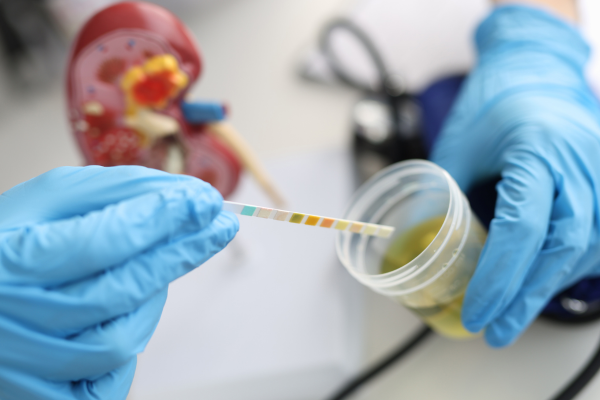August 12, 2014
Urinalysis helps detect early signs of kidney disease, diabetes, and more. Learn how this simple urine test works and why it’s important.
Have you ever wondered why health professionals ask for a urine sample? Urine can contain many different clues about how your body is doing, and testing it is known as “urinalysis.” This test can reveal important information about your health.
What Can Urinalysis Detect?
While most people are familiar with pregnancy tests or urine tests for employment and sports, there are many other medical uses for urine testing, including for kidney disease.
The kidneys remove waste materials, fluids, and other substances from the blood through urine. If the kidneys aren’t functioning properly, you may be able to tell from what they are and are not filtering out.
- Protein in the urine: Persistent protein is one of the earliest signs of chronic kidney disease.
- Glucose: A potential sign of diabetes.
- Blood or bacteria: Indications of infections or kidney stones.
Factors like diet, dehydration, medications, exercise, and more can affect the results. You'll likely need to provide follow-up samples.
Subscribe today!
Join the NKF Blog Newsletter
Get inspirational stories and kidney disease resources delivered to your inbox every month. You'll gain practical insights and expert advice to help you better understand and manage your kidney health no matter where you are on your kidney journey.
How Is Urinalysis Performed?
Urinalysis involves three main parts:
- Visual Examination: Checking the urine's color and clarity.
- Red urine may indicate blood. Cloudy urine may signal an infection.
- Dipstick Examination: Using chemically treated strips to check for various substances.
- Tests pH levels, for protein, glucose, creatinine, and more.
- Microscopic Examination: Looking at urine under a microscope.
- Looking for red and white blood cells, bacteria, and crystals could signal infections or kidney stones.
Limitations of Urinalysis
While urinalysis provides valuable clues, it doesn't answer all questions about your health. For example, a normal urinalysis doesn’t guarantee you don't have kidney disease. Finding protein in urine doesn’t guarantee you have kidney disease. Factors like hydration levels or a single sample may affect results.
Next time you’re asked to “pee in the cup,” remember that this simple test plays an important role in your health!






